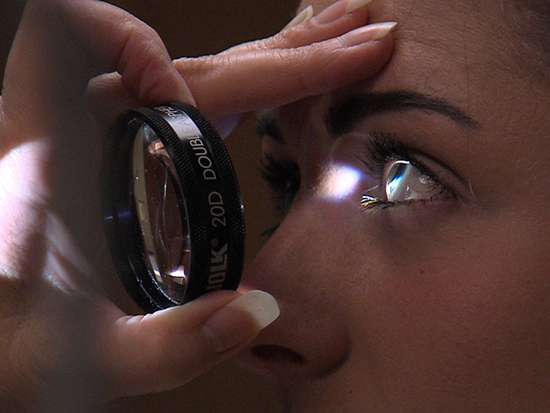
BIRMINGHAM, Ala. – More than 800,000 people a year visit their health care provider because of double vision, and around 50,000 people every year go to the emergency room because they have double vision.
According to Kristine B. Hopkins, O.D., professor at the University of Alabama at Birmingham School of Optometry and associate dean of Academic Affairs, double vision, or diplopia, is an eye disorder that causes patients to see two images of an object even though there is only one. This condition can be debilitating for patients and can make tasks like reading and driving virtually impossible. Further, some daily tasks may become unsafe.
Causes and symptoms
According to Hopkins, double vision typically occurs when the two eyes are not looking at the same object at the same time.
“If a person is looking at a road sign with the right eye but the left eye is looking somewhere else, this might cause a person to perceive two signs,” Hopkins said.
Double vision can occur for many reasons. Sometimes it occurs because the nerves that send signals to the eye muscles stop working. Other times, it occurs as the eye muscles lose their ability to keep both eyes aligned due to age-related changes or increased visual demands. It can also happen with some health conditions like thyroid dysfunction and neurological disorders.
“Double vision could be due to a head injury, eye injury or a stroke,” Hopkins said. “It can also happen if the eyes are focusing too hard and even sometimes because glasses are needed. If the double vision goes away when an eye is covered, it is probably an eye muscle problem.”
Treatment options
Hopkins says the first thing patients with double vision need to do is meet with their eye doctor to determine the cause because some causes for sudden double vision can be dangerous and must be evaluated right away.
“If you have any sudden changes in your vision, including double vision, you should contact your doctor right away,” Hopkins said. “Treatment of the underlying cause may resolve the double vision. If double vision persists, there are many treatments that we can implement to reduce or eliminate double vision for most patients.”
Once the cause of the double vision is determined, treatment options for double vision may include:
- The use of special lenses, that often include prisms, can redirect images seen by each eye to get them lined up together.
- Vision therapy, which is like physical therapy for the eye muscles, may also be helpful for some cases of double vision. This includes exercises to retrain the visual system to work more efficiently and accurately to relieve symptoms.
- Eye muscle surgery is also an option for some patients with significant and persistent eye muscle imbalances.
Is it preventable?
According to Hopkins, a healthy lifestyle that keeps your risk of stroke low is one way to reduce your risk of a sudden eye muscle weakness and double vision. However, often, double vision often occurs in patients with no risk factors and cannot be prevented.
To provide the best treatment to patients with double vision, UAB has launched its new Adult Double Vision Clinic under the leadership of Hopkins, who also serves as the chief of Vision Therapy. The patients seen in the double vision clinic are typically referred from other doctors after having a comprehensive eye exam. The role of this clinic is to address the patient’s visual complaints of double vision, eye strain and tracking difficulties. Patients may also schedule a comprehensive eye exam at UAB Eye Care at if they experience double vision and would like a referral.
Learn more about the Adult Double Vision Clinic or schedule an appointment by calling UAB Eye Care at 205-975-2020.





















